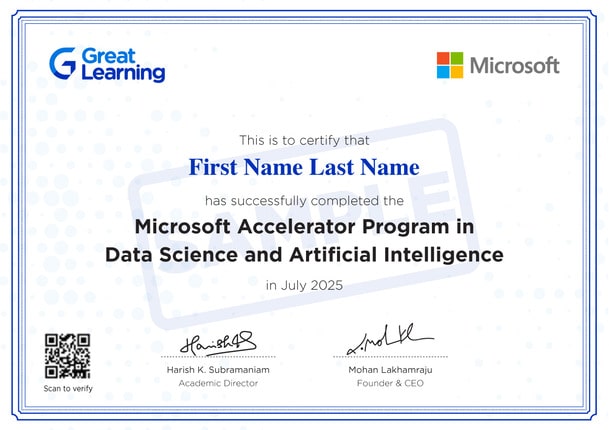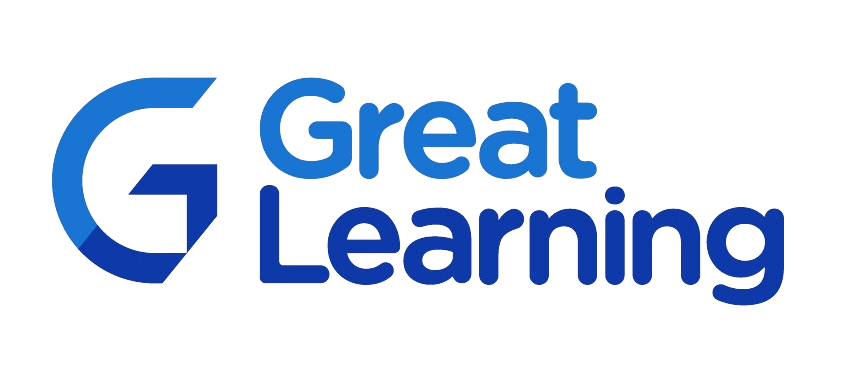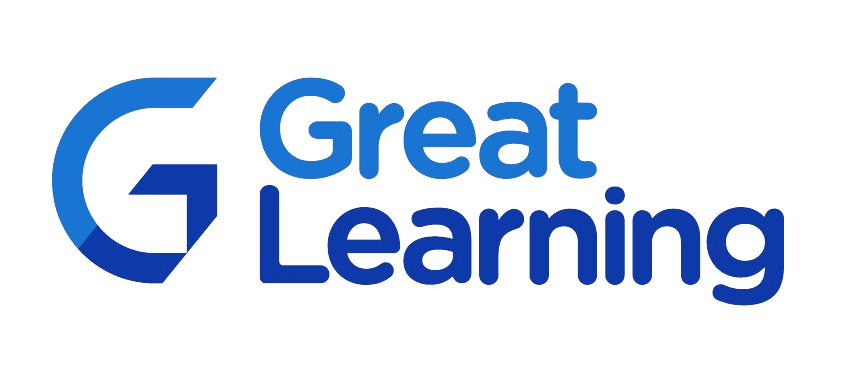Learn more about the course
Get details on syllabus, projects, tools, and more

Microsoft Accelerator Program in Data Science and Artificial Intelligence
What makes this program unique?
-

Microsoft & GL Certificate
Earn Credibility and respond directly to the need for market with this powerful Certiifcate
-

Career Support
Get career support with guided projects, interview questions and resume review
Program Outcomes
Elevate your career with Data Science & AI Skills
Become a Future-Ready Data Science & AI Professional
-
Earn a prestigious co-branded certificate from Microsoft & Great Learning to validate your proficiency and boost career credentials.
-
Transition to DSAI roles with a robust portfolio. Build 20+ case studies & 4 hands-on projects to prove your skills.
-
Master industry tools like Azure, NLP, Scikit-Learn, Python, Hugging Face & Langchain to solve real business challenges.
-
Accelerate your career with mentoring, interview prep, & resume reviews to lead DSAI projects from day one.
Key program highlights
Why choose Accelerator Program
-

Earn a Co-Branded Certificate
Graduate with a co-branded certificate from Microsoft and Great Learning that validates your skills and adds powerful credibility to your profile.
-

Master In-Demand Tech
Get hands-on with the entire DSAI workflow through 30+ hours of video content and labs covering Python, SQL, Azure AI, and more.
-

Build a Standout Portfolio
Get transition-ready by creating a robust portfolio of 4 hands-on projects and 20+ real-world case studies that prove your skills to employers.
-

Learn On Your Terms
Complete the program in just 3 months with the accelerated track, or learn at your own pace with a flexible online schedule designed to fit your commitments.
-

Gain a Real-World Edge
Learn from seasoned industry professionals and Microsoft Certified Trainers in weekly live sessions to turn theory into practical, job-ready knowledge.
-

Accelerate career growth
Get career support with guided projects, interview questions, unlimited mock interviews, and resume review.
Skills you will learn
Python for Data Science
SQL Analytics
Exploratory Data Analysis
SKILL TAG
Business Statistics
Generative AI & NLP
Model Deployment
Python for Data Science
SQL Analytics
Exploratory Data Analysis
SKILL TAG
Business Statistics
Generative AI & NLP
Model Deployment
Secure top Data Science & AI jobs
-
$501.03 B
Global Data Science Market by 2032
-
2.5 Lakh
Active AI-related jobs in India
-
41.5 % CAGR
In AI job openings across India
-
Up to 23 lakhs
Average annual salary
Careers in Data Science & AI
Here are the ideal job roles in AI sought after by companies in India
-
Machine Learning Engineer
-
Data Scientist
-
Business Analyst
-
Data Architect / Data Warehouse Architect
-
AI Architect
-
AI Product Manager
-
Business Intelligence Developer
-
Data Analyst
Our alumni work at top companies
- Curriculum
- Projects
- Tools
- Certificate
- Faculty
- Mentors
- Career support
- Fees
- FAQ

The Accelerator Program is ideal for
Ambitious individuals ready to explore or step into the fast-evolving world of Data Science and Artificial Intelligence
-
Career Starters
This program delivers the foundational, job-ready skills and guided, hands-on learning you need to confidently launch your career in Data Science and AI
-
Career Switchers
Make a strategic career shift into Data Science and AI with practical, industry-aligned skills and a recognized certificate, delivered through a flexible format that fits around your current job.
-
Aspiring Professionals
Enhance your capabilities to manage and lead AI initiatives by gaining practical skills through a quick, applied learning format designed to create immediate impact in your current role.
Curriculum
This program consists of five progressive courses that build a strong foundation in Data Science, AI, and Generative AI. It starts with core concepts in Data Science and AI, plus foundational skills in Python and SQL for data analysis. The next phase focuses on applying machine learning to regression and classification, optimizing model performance, and deploying models for broader access. The third course introduces deep learning and neural networks, including architectures for image classification. The final course explores Generative AI, covering text classification, content generation, and information retrieval using prompt engineering and retrieval-augmented generation. By the end, participants will be ready to build, optimize, and deploy AI solutions across various business contexts.
Course 01: Foundations of Data-driven Decision-Making
This module revolves around building a strong foundation in AI and Data Science by exploring their origins, evolution, and practical business impact, and introduces key terminology to help confidently navigate technical discussions. It also enables participants to read, explore, manipulate, and visualize data to tell stories, solve business problems, and deliver actionable insights and business recommendations by performing exploratory data analysis using some of the most widely used Python packages.
Week 01: Introduction to Data Science and AI
This week provides a comprehensive introduction to the key terminology in the fields of Data Science and AI, and helps participants identify real-world business applications of data science and AI across various industries.
Topics Covered:
- The role of data in the life of the general population
- Paradigms in data science: Inferential and computational
- Key Terminology (AI, DL, ML, GenAI, LLM)
- Business Applications of Data Science and AI
Sample Case Study: Airline Customer Review Sentiment Analysis
Analyze the reviews in tweets shared by customers of an airline regarding their experience with the services provided, and build a predictive model that can parse the customer reviews and predict the sentiment of the customer
Week 02: Python Programming Fundamentals
This week provides a comprehensive introduction to the core Python programming constructs such as variables, data structures, conditional statements, loops, and functions. Participants will also learn how to load, manipulate, transform, and save datasets using Numpy and Pandas to support basic data analysis workflows.
Topics Covered:
Sample Case Study: Superstore Data Analysis
Leverage numpy and pandas for data manipulation and analysis to uncover business insights, identify performance trends, and support data-driven decision-making in retail operations.
Week 03: Exploratory Data Analysis and Data Preprocessing
This week provides a comprehensive coverage of univariate, bivariate, and multivariate analysis using appropriate visualization techniques to uncover patterns and relationships. Participants will also explore ways to identify and handle missing values and outliers using standard data preprocessing techniques to ensure data quality.
Topics Covered:
Sample Case Study: Playstore Apps Analysis for Advertisement Opportunities
Analyze Playstore app data to uncover trends and patterns using univariate, bivariate, and multivariate analysis, enabling advertisers to identify high-potential apps and optimize their ad placement strategies effectively
Course 02: SQL for Data Analytics
This module provides a comprehensive coverage of the core concepts of databases and SQL, and provides practical experience on writing simple SQL queries to filter, manipulate, and retrieve data from relational databases, and utilize complex SQL queries with joins, window functions, and subqueries for data extraction and manipulation to solve real-world data problems and extract actionable business insights.
Week 04: Querying Data with SQL
This week will cover the fundamental database concepts and the role of SQL in querying structured data. Participants will learn how to write SQL queries to fetch, filter, and aggregate data from relational databases, and use SQL in-built functions to transform and analyze data effectively.
Topics Covered:
- Introduction to Databases and SQL
- Fetching data
- Filtering data
- Aggregating data
- In-built functions (Numeric, Datetime, Strings)
Week 05: Advanced Querying Techniques for Data Analysis
This week focuses on constructing SQL queries using various types of joins to combine data across multiple tables, implementing window functions to perform advanced analytics like ranking, and writing subqueries to retrieve and filter data in nested contexts for complex query logic.
Topics Covered:
- Joins
- Window functions
- Subqueries
- Order of Execution
Course 03: Machine Learning for Predictive Modeling
This module will provide a practical understanding of machine learning techniques to drive data-informed decisions, modeling linear relationships using linear regression, classifying data using decision trees, exploring techniques for tuning and validating models to ensure optimal performance, applying clustering methods for insightful data segmentation, and deploying predictive models to translate model outputs into actionable business outcomes across diverse domains.
Week 06: Regression Techniques for Supervised Learning
In this week, participants will analyze relationships between variables using correlation and assess their suitability for regression modeling, build and interpret simple and multiple linear regression models, including handling categorical predictors, and evaluate regression models using appropriate performance metrics to assess prediction accuracy.
Topics Covered:
Sample Case Study: Medical Insurance Premium Prediction
Analyze data containing customer demographics and health-related factors, and build a linear regression model to predict medical insurance premiums to support fair pricing and informed decision-making in the insurance sector.
Week 07: Tree-based Techniques for Supervised Learning
This week will cover the structure and working of decision trees for classification and regression tasks. Participants will understand how to apply impurity measures and splitting criteria to grow effective decision trees, implement pruning techniques to control overfitting, and evaluate decision tree models using appropriate performance metrics in business scenarios.
Topics Covered:
- Business Problem and Solution Space - Classification
- Introduction to Decision Trees
- Impurity Measures and Splitting Criteria
- Pruning
- Decision Trees for Regression
Week 08: Unsupervised Learning
This week will cover the business scenarios suitable for clustering and formulate them as unsupervised learning problems. Participants will compare different distance metrics and assess their impact on clustering outcomes, differentiate between various clustering techniques, and implement K-means clustering to segment data and interpret results to generate business insights
Topics Covered:
- Business Problem and Solution Space - Clustering
- Distance Metrics
- Introduction to Clustering
- Types of Clustering
- K-means Clustering
Week 09: Model Tuning and Deployment
In this week, participants will learn how to apply K-fold cross-validation to assess model robustness and reduce overfitting, implement resampling techniques like oversampling and undersampling to handle class imbalance in datasets, and tune model hyperparameters using GridSearchCV and evaluate performance improvements. Participants will also learn how to deploy machine learning models using Streamlit to create user-friendly applications that support business decision-making.
Topics Covered:
Sample Case Study: Machine Predictive Maintenance
Analyze the data of an auto component manufacturing company and develop a predictive model to detect potential machine failures, determine the most influential factors on machine health, and provide recommendations for cost optimization to the management.
Course 04: Deep Learning for Computer Vision
This module will introduce the fundamentals of neural networks, dive into Convolutional Neural Networks (CNNs) for high-performance image classification, and utilize transfer learning to solve real-world problems in fields such as healthcare, retail, and manufacturing through intelligent image analysis.
Week 10: Neural Networks and Image Classification
This week will cover the role of neural networks in solving complex problems, differentiate between ANN and CNN architectures, identify suitable use cases for each in business contexts, and build and train basic MLP and CNN models using appropriate architectures and optimization strategies. Participants will also explore the concept of transfer learning and demonstrate how pre-trained models can be adapted for new tasks.
Topics Covered:
- Deep Learning and History
- Multi-layer Perceptron
- Types of Activation Functions
- Training a Neural Network
- Backpropagation
- Types of Optimizers
- ANN Vs CNN
- CNN Architecture
- Introduction to Transfer Learning
Sample Case Study: COVID Detection Build an image classifier using pre-trained CNN architectures for COVID detection, enabling efficient and scalable medical diagnostics from imaging or clinical data.
Course 05: Generative AI for Natural Language Processing
This module will explore the rapidly evolving world of Natural Language Processing (NLP) and Generative AI, where machines understand, generate, and interact using human language, dive into key innovations such as transformers and large language models, craft effective prompts through prompt engineering, and enhance generative performance using vector databases and Retrieval-Augmented Generation (RAG).
Week 11: Large Language Models for Generative Tasks
This week will cover the core concepts of Generative AI and Large Language Models (LLMs), analyze the architectural components that power ChatGPT and their role in generating human-like responses, and define the concept of prompt engineering. Participants will also apply different prompting techniques to optimize LLM responses for specific business use cases.
Topics Covered: Sample Case Study: Restaurant Review Analysis
Analyze the provided sample of customer reviews for different restaurants for a leading global food aggregator and build a predictive model to analyze the reviews and tag them, thereby enhancing the company's ability to understand customer sentiments at scale, enabling data-driven decision-making, and improving overall customer satisfaction.
Week 12: Enhanced Text Generation via Augmentation
This week will cover the core principles of Retrieval-Augmented Generation (RAG) and its significance in enhancing LLM performance for domain-specific tasks. Participants will gain an understanding of the key components of a RAG pipeline, including retrievers, vector databases, and generators, demonstrate the use of semantic search and vector databases to retrieve relevant context for generative tasks, and design and evaluate prompts tailored for RAG workflows to improve output quality and business task alignment
Topics Covered:
- Introduction to Retrieval Augmented Generation (RAG)
- Building Blocks of RAG
- Vector Database and Semantic Search
- Devising and Evaluating Prompts for RAG
Sample Case Study: Real-Time Inventory Tracking & Logistics Optimization
Integrate external knowledge sources to enhance data retrieval accuracy and implement Retrieval-Augmented Generation (RAG) to deliver real-time inventory and logistics updates, ensuring seamless supply chain management and proactive decision-making
Career Prep Session
Exploring ways to apply the skills acquired from the program for professional advancement. (Career Pathway)
Delving into strategies for leveraging the competencies developed through the program to propel one's career forward. This involves a comprehensive approach to understanding how the skills obtained can be effectively utilized in various professional contexts, aiming to open up new avenues for career growth and development.
Work on hands-on projects & case-studies
-
4
hands-on projects
-
20+
case studies
Description
Aid financial analysts at Apple to extract key information from long financial documents like annual reports very quickly using RAG and thereby increasing efficiency in making key financial decisions.
Skills you will learn
- Generative AI
- Large Language Models
- Prompt Engineering
- Hugging Face
- Retrieval Augmented Generation
- Vector Databases
- Langchain
Description
Analyse the customer reviews for different restaurants for a leading global food aggregator and use Generative AI models to analyse the reviews and tag them, thereby enhancing the company's ability to understand customer sentiments at scale, enabling data-driven decision-making, and improving overall customer satisfaction
Skills you will learn
- Generative AI
- Large Language Models
- Prompt Engineering
- Hugging Face
Description
Build a Data Science solution for a chain of hotels that will help them predict the likelihood of a booking getting canceled so that they can take measures to fill in potential vacancies and reduce revenue loss.
Skills you will learn
- Exploratory Data Analysis
- Decision trees
- Random Forest
- Scikit-Learn
- Pandas
Description
Analyze credit card transaction data and build a neural network model to capture the complexities in the data and predict the probability of a transaction being fraudulent to help minimize financial losses incurred by the financial institution and the cardholders.
Skills you will learn
- Exploratory Data Analysis
- Neural Networks
- TensorFlow
- Keras
Description
Explore and visualize the data, build a linear regression model to predict the prices of used cars, and generate a set of insights and recommendations that will help the business.
Skills you will learn
- Exploratory Data Analysis
- Data Visualization
- Bagging
- Random Forests
- Scikit-Learn
Description
Analyze the data provided by a consultation firm that partners with banks, answer key questions provided, draw actionable insights, and help the company to improve the business by identifying the attributes of customers eligible for a credit card.
Skills you will learn
- Exploratory Data Analysis
- Data Visualization
- Pandas
- Seaborn
Description
Perform an exploratory data analysis and provide actionable insights for a food aggregator company to get a fair idea about the demand of different restaurants and cuisines, which will help them enhance their customer experience and improve the business
Skills you will learn
- Python
- Numpy
- Pandas
- Seaborn,
- Univariate Analysis
- Bivariate Analysis
- Exploratory Data Analysis
Description
Analyze the data of Visa applicants, build a predictive model to facilitate the process of visa approvals, and based on important factors that significantly influence the visa status recommend a suitable profile for the applicants for whom the visa should be certified or denied.
Skills you will learn
- Exploratory Data Analysis
- Data Preprocessing
- Bagging
- Random Forest
- Boosting
- AdaBoost
- Gradient Boosting
- XGBoost
- GridSearchCV
Description
Analyze the data of stock news and prices, develop an AI-driven sentiment analysis system that will automatically process and analyze news articles to gauge market sentiment, and summarize the news weekly to help financial analysts optimize investment strategies and improve client outcomes.
Skills you will learn
- Exploratory Data Analysis
- Word Embeddings
- Transformers
- Sentence Transformers
- Large Language Models
- Prompt Engineering
- Sentiment Analysis
Master in-demand Data Science & AI tools
Get DSAI training with in-demand tools to enhance your workflow, optimize models, and build DSAI solutions
Certificate of Completion by Microsoft & Great Learning
Receive a co-branded Certificate of Completion from Microsoft & Great Learning -proof of your DSAI skills, ready for your resume and LinkedIn.

* Image for illustration only. Certificate subject to change.
Meet your faculty
Our end-to-end program is led by 10+ year veterans—faculty and mentors from top tech firms and academia you can verify on LinkedIn
Interact with Industry Experts
Interact with experienced artificial intelligence experts who will guide you in your learning & career journey
Get career support
-
Access to guided projects
Apply your skills with 4 industry-aligned projects and 20+ case studies to build a powerful portfolio.
-
Interview Preparation
Hone your interview skills with unlimited AI-powered mock interviews and get access to a curated set of commonly asked questions.
-
Resume & Profile review
Get your resume reviewed to highlight your skills & projects and sharpen your profile.
-
Career Mentoring
Gain valuable career strategies and industry insights from seasoned professionals in our mentoring masterclasses.
Course fees
The course fee is ₹ 45,000 + GST
Invest in your Data Science & AI career
-

Earn a prestigious co-branded certificate from Microsoft & Great Learning to validate your proficiency and boost career credentials.
-

Transition to DSAI roles with a robust portfolio. Build 20+ case studies & 4 hands-on projects to prove your skills.
-

Master industry tools like Azure, NLP, Scikit-Learn, Python, Hugging Face & Langchain to solve real business challenges.
-

Accelerate your career with mentoring, interview prep, & resume reviews to lead DSAI projects from day one.
-
INSTALLMENT PLANS
Upto 6 months EMI plans
Explore our payment plan
View Plans
Third Party Credit Facilitators
Check out different payment options with third party credit facility providers
*Subject to third party credit facility provider approval based on applicable regions & eligibility
Frequently asked questions
What is this program about?
The Microsoft Accelerator Program in Data Science & AI is a 3-month, industry-recognized program by Microsoft & Great Learning, with flexible completion of up to 9 months.
Covers Python, SQL, Machine Learning, Deep Learning, Generative AI
Hands-on, project-driven approach with 4 industry projects + 20+ case studies
How does the program work?
Format: Self-paced video lectures + weekend live mentor sessions + hands-on projects Access: Recordings of all live sessions + option to re-attend future batches Start date: Begin immediately after enrollment with recorded modules; live sessions as per batch
Duration: 3 months (extendable up to 9 month
What will I walk away with?
- Mastery of tools: Python, SQL, TensorFlow, Tableau, Hugging Face, LangChain, Azure ML Studio
- Career-ready portfolio with projects and case studies
- A prestigious Microsoft–Great Learning certificate
- Real-world project experience: customer segmentation, predictive maintenance, insurance premium prediction, financial report analysis
What kind of career support will I get?
- Career Mentoring Masterclasses by experts from top companies
- Resume reviews to sharpen your profile
- Curated interview prep material tailored for Data Science & AI roles
Who is this program for?
Working professionals aiming to move into Data Science & AI Graduates and early-career professionals looking for job-ready skills Mid-career professionals wanting to upskill for AI-driven leadership roles
No strict prerequisites — open to both technical and non-technical backgrounds
How much does it cost and how can I pay?
Program fee: ₹45,000 + GST (includes ₹5,900 admission fee)
Flexible EMI options available
Who will teach and mentor me?
You’ll be guided by Microsoft Certified Trainers and top industry practitioners from JP Morgan, Tata Technologies, Accenture, and Novartis.
Notable mentors include:
- Dr. Abhinanda Sarkar – Ph.D. Stanford, Ex-MIT faculty, Former GE
- Dr. Pavan Kumar Gurazada – Ph.D. in ML, Author, Advisor at Constems AI
- Dr. Bradford Tuckfield – Ph.D. Wharton, Consultant in pharma, manufacturing & tech


 Speak with our expert
Speak with our expert
































